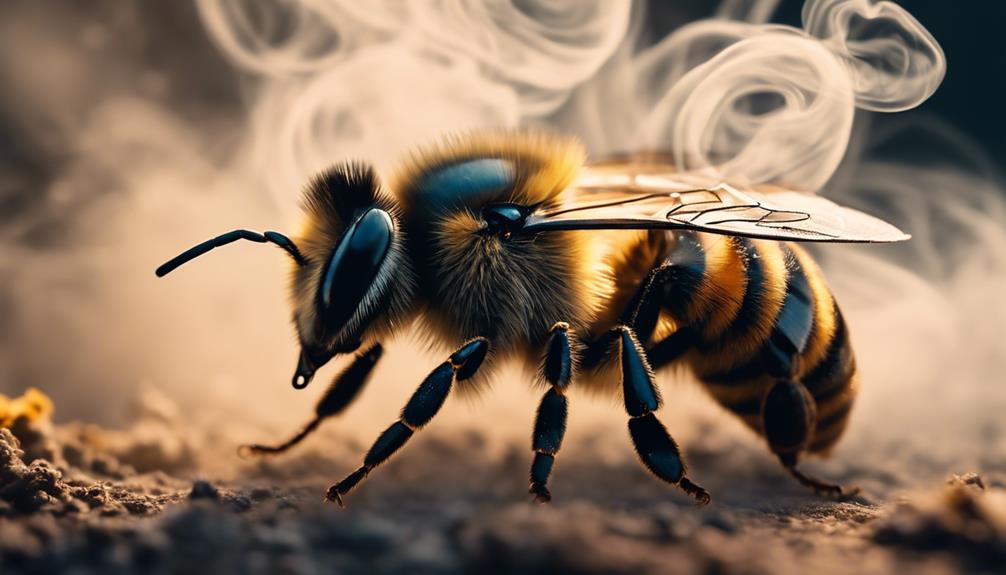Hey there! So, the buzz about bees and smoke, especially from cannabis, is quite interesting. Bees aren’t really into getting high; they’re more about collecting pollen from the plants. You see, bees don’t have the right receptors for cannabis to affect them, so they’re all about the pollination game. They play a vital role in making sure those cannabis plants can reproduce and keep things blooming. If you’re curious about how bees and cannabis interact beyond the smoke, there’s a whole lot more to discover!
Main Points
- Bees do not get high from cannabis smoke due to the lack of cannabinoid receptors.
- Their attraction to cannabis is for pollen collection, not psychoactive effects.
- Cannabis smoke does not influence bee behavior around plants.
- Bees play a vital role in pollination, benefiting the cannabis industry.
- Protecting bee populations is crucial for ecosystem health and food security.
Bee Behavior Around Cannabis Smoke
When observing bee behavior around cannabis smoke, it becomes evident that these insects are primarily drawn to cannabis plants for pollen collection rather than any interaction with the smoke itself.
Bees, with their amazing ability to detect and collect pollen, aren’t interested in the smoke produced by cannabis. Their attraction lies in the vital source of pollen that these plants offer for their pollination efforts.
Unlike humans, bees don’t possess cannabinoid receptors, so the smoke from cannabis doesn’t have any psychoactive effects on them.
This emphasizes that the relationship between bees and cannabis is centered around pollination, highlighting the essential role these buzzing creatures play in ensuring the seed production of cannabis plants.
Lack of Bee Response to THC
Despite the psychoactive properties of THC in cannabis, bees don’t respond to this compound due to their lack of cannabinoid receptors. When it pertains to bees and cannabis, it’s all about the pollen, not the buzz. Here are some key points to ponder:
- Bees don’t possess the necessary receptors to be affected by THC.
- Research confirms bees aren’t influenced by cannabis psychoactive effects.
- Bee behavior around cannabis focuses on pollen collection, not getting high.
- Bees are attracted to cannabis plants as an essential pollen source.
- Cannabis plants serve as an important resource for beekeepers looking to attract bees for pollination.
Understanding these facts sheds light on the unique relationship between bees, cannabis plants, and the essential role they play in the ecosystem.
Importance of Bee Pollination
Moving from the discussion on bee behavior around cannabis, it becomes evident that bee pollination is a fundamental process essential for the reproduction of numerous flowering plants worldwide. Bees play an important role in our ecosystem by pollinating over 85% of the world’s flowering species. This process isn’t just about pretty flowers; approximately one-third of the global food supply relies on bee pollination.
Imagine your favorite fruits, vegetables, and seeds – bees make them possible through their pollen transfer magic. The impact goes beyond our plates; bees contribute billions of dollars to the economy through their pollination services. Without bees, we face the risk of decreased crop yields, reduced biodiversity, and potential food shortages.
It’s clear: bees are the unsung heroes maintaining the delicate balance of our ecosystems.
Cannabis Industry and Bee Interaction
Exploring the symbiotic relationship between the cannabis industry and bee pollination reveals the pivotal role bees play in seed production and genetic diversity. Bees are essential for pollinating male cannabis plants, not for psychoactive reasons, but for collecting cannabis pollen that aids in seed development. The presence of male plants is crucial for maintaining genetic diversity within the industry. Additionally, attracting bees by growing tall cannabis plants supports pollination, ultimately contributing to robust seed production. This natural partnership highlights how bees and cannabis interact harmoniously, benefiting both ecosystems.
- Bees are attracted to male cannabis plants for pollen, not female plants containing THC and CBD.
- Male cannabis plants play a vital role in pollinating female plants to produce seeds for the industry.
- Bees aren’t attracted to cannabis plants for psychoactive reasons but for their pollen.
- The presence of male cannabis plants is essential for genetic diversity and seed production in the cannabis industry.
- Growing tall cannabis plants can attract bees, supporting pollination and seed development.
Bee Populations and Ecosystem Health
Bee populations, essential for pollinating crops and maintaining ecosystem balance, are fundamental to global food production sustainability. Declining bee populations pose a significant threat to agriculture and biodiversity.
Beekeepers use hive inspections to monitor bee health, ensuring the well-being of these beneficial insects. Native bees, indispensable pollinators, are also at risk from factors that harm bees, impacting ecosystem health.
Protecting bee populations is critical for safeguarding the balance of natural habitats and ensuring food security worldwide. Conserving bees not only supports agricultural sustainability but also contributes to the overall health of our ecosystems.
Roger Thomas is a seasoned beekeeper and hive architect with a deep-seated passion for sustainable living. His fascination with bees has shaped his professional career, giving him practical and theoretical expertise in bee behavior, colony health, and optimal hive conditions. Roger’s technical skills shine in his bespoke hive creations that cater to the specific needs of diverse bee species, while his sustainable practices promote environmental balance and the wellbeing of the bee population.
As he continues his journey in beekeeping, Roger has become a dedicated advocate for responsible practices and an insightful educator in his field. His posts aim to inspire new beekeepers, underline the importance of sustainability, and showcase the remarkable contribution bees make to our ecosystem. Roger invites you to join him as he delves into the world of bees and the rewarding, honey-sweet art of beekeeping.

